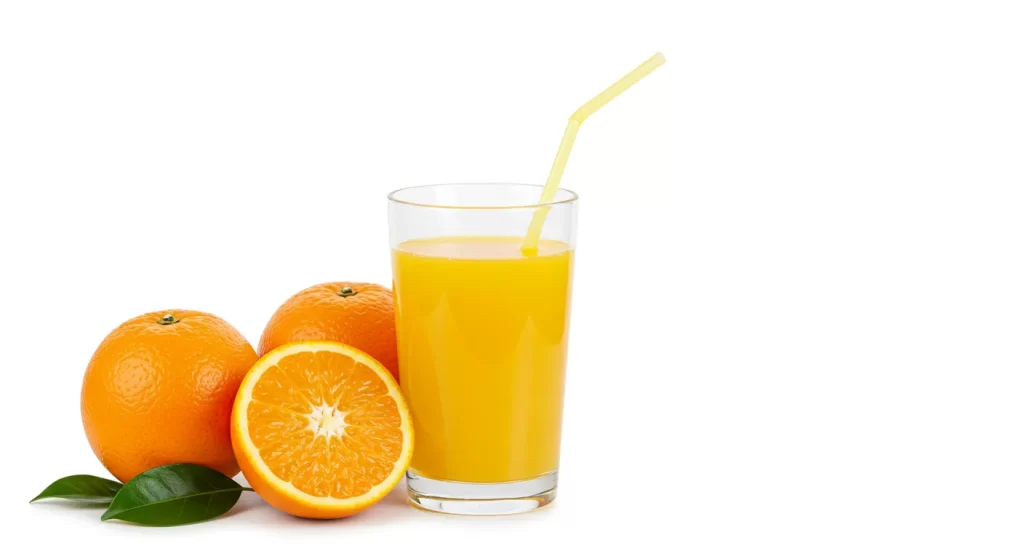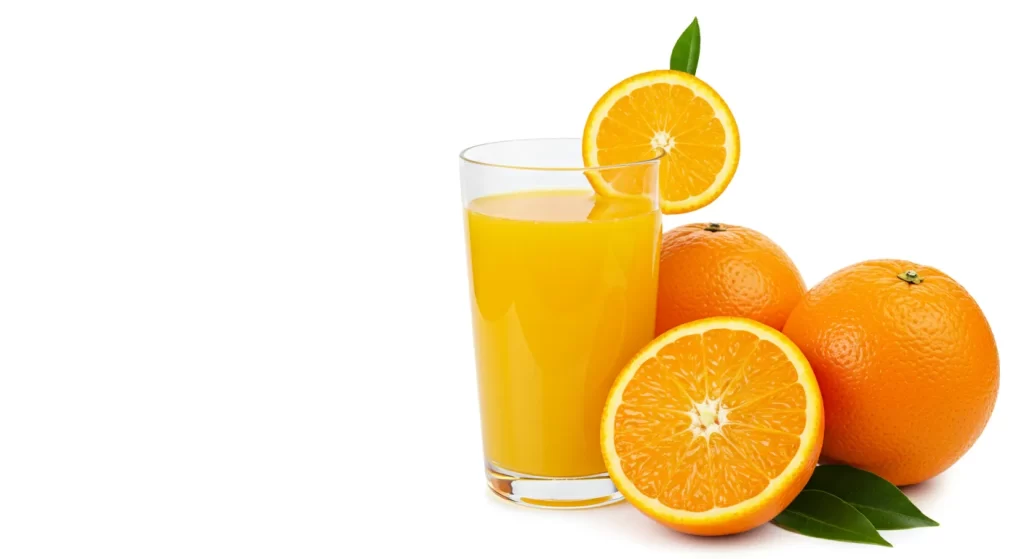Table of Contents
Why Fresh Squeezed Orange Juice is the Healthiest Way to Start Your Day
There’s nothing quite like the taste of fresh squeezed orange juice—pure, refreshing, and bursting with natural sweetness! Unlike store-bought juices loaded with preservatives and added sugar, homemade orange juice delivers maximum flavour and health benefits in every sip.
Whether you’re making it for a quick morning boost, a refreshing summer drink, or a nutrient-packed addition to your diet, we’ll show you the best techniques to extract every last drop of goodness. Enjoy the freshest, tastiest orange juice—straight from the fruit to your glass! 🍊✨
Fresh squeezed orange juice is not just a refreshing drink. It’s a nutrient-rich powerhouse. This simple drink has Vitamin C, antioxidants, and essential minerals. It provides many health benefits.
It can significantly boost your daily routine. But how exactly does freshly squeezed juice stand out from store-bought versions? And are there any potential downsides? Let’s explore the science, health benefits, and juicing tips that make fresh-squeezed orange juice a healthy choice.
What Makes Fresh Squeezed Orange Juice Unique?
Choosing fresh-squeezed orange juice over packaged juices benefits your health and the environment. Packaged juices often come in single-use plastic containers, contributing to plastic waste. By squeezing your own juice, you can reduce your plastic consumption and environmental footprint.
The taste of fresh juice is not the only difference. Its nutrient profile is much better, too. It has a lot of Vitamin C and antioxidants. These nutrients are often lost in the pasteurization process used for mass-produced juices. The unique, vibrant taste of fresh squeezed orange juice, with its delightful tang and sweetness, is an experience that store-bought versions can’t match.
Flavonoids and Carotenoids: The Antioxidants in Orange Juice

Fresh squeezed orange juice stands out for its rich antioxidants. Key antioxidants include flavonoids like hesperidin and naringenin. These compounds help reduce inflammation, improve heart health, and boost circulation. Orange juice also contains carotenoids, such as beta-carotene. These provide benefits like enhancing skin health and supporting vision.
An American Journal of Clinical Nutrition study found flavonoids like hesperidin can lower inflammation. They may lower the risk of chronic conditions, such as heart disease. These antioxidants support the immune system and help fight oxidative stress caused by free radicals.
The Nutritional Edge of Fresh Orange Juice
Fresh-squeezed orange juice is different from store-bought juice. It retains all its natural nutrients, which processing often destroys. For example, it has a lot of Vitamin C. This vitamin is important for the immune system. Studies show that Vitamin C helps produce collagen, which is crucial for healthy skin.
Also Read: Smothered Chicken and Rice: A Comforting One-Pan Meal
The National Institutes of Health says Vitamin C is vital for making collagen, the protein that keeps skin young and elastic. A single glass of fresh orange juice can provide over 100% of this essential nutrient’s recommended intake, helping you maintain healthy and youthful skin.
Addressing Common Health Concerns with Fresh Orange Juice
While fresh-squeezed orange juice is a fantastic source of nutrients, a few considerations should be made before making it a daily habit.
Sugar Content and Blood Sugar Levels
Fresh-squeezed orange juice is natural but contains a lot of sugar, which can affect blood sugar levels. People with diabetes or those watching their sugar intake should be careful with portion sizes.
The sugar in fresh juice isn’t like the added sugars in processed drinks. It’s natural sugar, which can still impact blood glucose levels, especially if consumed in large amounts.
High Acidity and Digestive Sensitivity
Orange juice is very acidic. This high acidity can irritate the stomach lining and worsen conditions like acid reflux or heartburn. Consider limiting your intake if you feel digestive discomfort after drinking orange juice. It may also help to consult a healthcare provider for alternatives.
The Science Behind Squeezing an Orange

Squeezing an orange may seem simple. But knowing the process can explain why fresh-squeezed orange juice is so nutritious and tasty.
How Fresh Orange Juice is Made
Making fresh orange juice involves extracting the juice directly from the pulp. Whether using a manual juicer, a hand press, or an electric juicer, the juice is released from the fruit’s flesh while leaving behind the peel and pulp. Unlike pasteurized juices, natural sugars, vitamins, and antioxidants stay intact because the juice isn’t heated. keva juice menu.
Nutrient Preservation During Squeezing
When you squeeze fresh orange juice, the nutrients, such as Vitamin C and antioxidants like flavonoids, remain intact. However, these nutrients degrade when exposed to air, so it’s best to consume the juice soon after squeezing. Storing it in an airtight container in the fridge can help preserve its freshness for a short time, but ideally, fresh juice should be consumed within 24 hours.
Also Read: Pepper and Bark: Festive Peppermint Bark Recipe Delight
Best Time to Squeeze Oranges for Maximum Freshness
To get the most out of your fresh juice, it’s important to choose oranges that are at their peak ripeness. Valencia oranges are perfect for juicing because of their high juice content and sweetness. A ripe orange will feel heavy for its size and have smooth skin. Oranges picked in season, usually from November to April, offer the best flavor and nutrient content. By selecting the right oranges, you can ensure your juice is as fresh and delicious as possible.
Health Benefits of Fresh Squeezed Orange Juice
Drinking freshly squeezed orange juice is not only refreshing, but it’s also an easy way to boost your health. Here’s how this vibrant drink can benefit your body:
Vitamin C: The Immune System Supporter
One of the main attractions of fresh squeezed orange juice is its high Vitamin C content. Vitamin C is a powerful supporter of a healthy immune system, helping to ward off illnesses and keeping you feeling your best. It also aids in absorbing iron, a mineral essential for preventing anemia.
Antioxidants: Fighting Inflammation and Promoting Heart Health
Hesperidin and naringenin are flavonoids in orange juice. They have strong anti-inflammatory effects. Inflammation is a leading cause of many chronic conditions, including heart disease. Antioxidants may lower blood pressure and boost heart health. jungle juice carton.
A Journal of Nutritional Biochemistry study found that naringenin can lower cholesterol. It also prevents the oxidation of bad cholesterol (LDL), reducing heart disease risk.
Hydration and Electrolytes
Orange juice is also an excellent source of hydration, as it contains both water and electrolytes. It’s an ideal post-workout drink, replenishing fluids and helping maintain body balance. The natural sugars in orange juice provide quick energy, making it a great choice after exercise or on hot days.
Choosing the Right Oranges for Squeezing
The quality of the oranges you select directly impacts your juice’s flavor and nutrient content. By choosing the right oranges, you can ensure your juice is as fresh, delicious, and nutritious as possible, empowering you to make the best choices for your health. nippy’s fruit juices.
Best Varieties for Fresh Juice
The best orange varieties for juicing are:
- Valencia, for its sweetness and high juice yield.
- Navel, for its easy peeling and seedless nature.
- Blood Oranges, for their unique, tangy flavor.
Each variety has its distinctive taste, so experiment to see which one you prefer.
How to Pick the Perfect Orange
Look for oranges that are heavy for their size—this usually indicates a high water content, which is essential for making juice. Fresh oranges should feel firm, with smooth, shiny skin. The orange may be past its prime if it feels soft or has wrinkled skin.
Tips for Storing Fresh Squeezed Orange Juice

Fresh squeezed orange juice is best when consumed immediately, but if you need to store it, here are a few tips:
Storing in the Refrigerator
Store fresh juice in an airtight glass container to keep it cold and prevent oxidation. Ideally, consume the juice within 24-48 hours to get the most out of the nutrients. jungle juice carton.
Freezing Orange Juice for Later
If you have excess juice, freezing it is a great option. Pour the juice into ice cube trays or freezer-safe containers. Frozen orange juice can stay fresh for up to six months.
Unique Uses for Fresh Orange Juice
Did you know fresh squeezed orange juice can do more than quench your thirst? Here are a few alternative ways to use it:
Orange Juice for Skin Care
Orange juice’s high Vitamin C content makes it a fantastic natural ingredient for skincare. The antioxidants help brighten the skin, reduce dark spots, and promote a youthful glow. You can apply fresh orange juice directly to your skin or use it in DIY facemasks.
Read Also: Creamy Cocoa Fruit Cup Recipe: Fresh Cacao Delights Await!
Orange Juice as a Natural Cleaning Agent
Orange juice’s acidity can be used as a natural cleaner for surfaces around the house. Mix it with vinegar and water for a fresh-smelling, effective cleaning solution. keva juice menu.
Why Fresh Squeezed Orange Juice Should Be Part of Your Daily Routine
Fresh-squeezed orange juice is more than just a tasty drink. It’s packed with nutrients. This beverage can boost your immune system, improve skin health, and keep you hydrated.
Adding it to your morning routine gives you Vitamin C, antioxidants, and natural hydration. Just remember to enjoy it in moderation. If you’re worried about sugar or acidity, it’s especially important to remember that.

